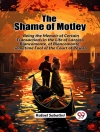L. Dougall’s ‘The Mermaid: A Love Tale’ is a captivating novel that intricately weaves together elements of romance, fantasy, and drama. Set in a seaside village, the story follows the forbidden love affair between a young fisherman and a mysterious mermaid, exploring themes of love, sacrifice, and societal expectations. Dougall’s lyrical prose and vivid descriptions transport the reader to a world where mythical creatures and human emotions collide, creating a unique literary experience reminiscent of folklore and fairy tales. The novel’s rich symbolism and allegorical elements contribute to its timeless appeal, making it a compelling read for lovers of romantic literature. With ‘The Mermaid: A Love Tale, ‘ Dougall showcases her talent for blending fantasy and romance in a thought-provoking narrative that resonates with readers of all ages.
Over de auteur
L. Dougall, a somewhat enigmatic figure in the literary canon, remains best known for the novel ‘The Mermaid: A Love Tale’, a contribution to the romantic fiction genre during the late 19th century. Not much is widely published about Dougall’s personal life or literary career, which encapsulates the challenges of historical literary scholarship, especially when it comes to authors who did not reach a wide level of acclaim during or post their lifetime. ‘The Mermaid’ takes readers on a whimsical journey through its narrative, weaving elements of fantasy with human emotion in a way that was quite distinctive for its time. Dougall’s literary style in this novel resonates with the romantic tradition, while also hinting at early modernist sensibilities with its exploration of psychological depth and complex characterizations. Although not a part of the mainstream literary discourse, Dougall’s contributions, specifically through ‘The Mermaid’, shed light on the undercurrents of literary transitions from the Victorian to the Edwardian era. Interested readers and scholars often find in Dougall’s work a unique and subtle challenge to contemporary norms, both literary and societal. Despite a somewhat obscured historical footprint, L. Dougall’s work remains a subject of interest for those delving into the overlooked alcoves of literary history.












